#[ kaiser and ira ]
Explore tagged Tumblr posts
Note
lemme get this straight. your type is a hot, sexy, smart woman who'll love you unconditionally?
you got this from the new character magazine, right?
#[ kaiser's asks ]#[ kaiser and ira ]#bllk rp#blue lock roleplay#blue lock rp#bllk roleplay#kaiser rp
10 notes
·
View notes
Text
[🌹]: this is, HANDS DOWN, one of the most amazing blue lock tropes.
it just sounds so fun and would have SO much drama! maybe if the reader wasn't already with sae?
maybe if they both saw her at one of their games and became obsessed with her or something? and they fight over her?
we need more of this, PLEASE����
Itoshi Sae rolled his eyes as he saw Michael Kaiser flirting and trying to be more touchy with you—twirling a strand of your hair around his finger, holding eye contact just a bit longer than usual, leaning slightly towards when you speak, typing something on your phone.
“Oh, so do you like centre-forwards?” he’d ask looking back at Sae, smirking, and the Japanese player was never more annoyed. Kaiser's gaze returned to you and as you opened your mouth to say something, someone else grabbed your hand, fingers interlaced with yours, leading you away from the cocky striker.
“Sorry,” you said, looking over your shoulder at the blonde man with a teasing smile. “I’m more into midfielders.”
Kaiser's smirk faltered for the first time, clearly taken aback. He watched you blow him a playful kiss, stunned as he realized you'd been using him to get a reaction out of Sae this whole time. Clearly, he was not used to being played with like this or at all. This was a game he hadn’t expected to lose, but it’s not game over yet.

©2024 kaiser1ns do not copy, repost or modify my work
#blue lock#bllk#blue lock fanfiction#bllk fanfic#itoshi sae x reader#itoshi sae x y/n#itoshi sae x you#michael kaiser x reader#michael kaiser x y/n#michael kaiser x you#ira's thoughts#ira reblogs
2K notes
·
View notes
Text



( 𝖻𝖾𝗁𝗂𝗇𝖽 𝗒𝗈𝗎𝗋 𝗌𝗆𝗂𝗅𝖾 𝗂𝗌 𝗍𝗁𝖾 𝖽𝖾𝗏𝗂𝗅'𝗌 𝗍𝖾𝗆𝗉𝗍𝖺𝗍𝗂𝗈𝗇 !
HIATUS till may / march or till my finals are over lol.
— ira. alex volkov's, dante russo & kai young's love. jungkook biased. akutagawa's love. KAISER’S AND ISAGI'S.
. minors please proceed with caution. lowercase writing. banners do not belong to me. female reader centered fics. nsfw & sfw. bsd centered. talk to me pls i don't bite. do not steal my work please. my fics belong purely to me and plagiarism is a crime.
masterlist . selfships.
. past ; ֶָ֢ REFLECTIONS ; where have you been all this time?
. current ; ֶָ֢ STANDING NEXT TO YOU : a dazai osamu fic series.
ֶָ֢ ONE LAST TIME : a dazai osamu fic series
. future ; ֶָ֢ refer here.

26 notes
·
View notes
Text
immortal longings characters + their roman counterparts
i've not been on this blog in like literal ages but i just finished reading this book and i figured making these connections might allow for some foresight into the rest of the trilogy but god forbid i put some of my findings on goddamn twitter of all places so here it is
(spoilers under the cut for obvious reasons)
calla tuoleimi (cleopatra, ptolemy) and anton makusa (antony, marcus) are obvious; i think this is the cut and dry point stated for anyone even trying to look into this book
august avia and otta avia = octavian (later, augustus) and his sister, octavia, also mark antony's wife; while tuoleimi is an obvious bastardization of ptolemy, i'm not sure if shenzhi stands for something (or maybe i'm just dumb who knows)
king kasa = caesar/kaiser, bc like yeah
galipei weisanna = marcus vipsanius agrippa (this might be a stretch but its the closest approximation i can find both through their roles in the play and their names)
leida miliu = marcus aemilius lepidus, one of the triumvirates alongside antony and octavian
pampi magnes = sextus pompeius magnus pius, one of the rebels working against the triumvirate
eno = gnaeus domitius ahenobarbus (i could not find anything on this guy other than him being aligned with antony at some point and this pissing off octavian)
chami + yilas = charmion and iras, two of cleo's servants and advisors
pls let me know if i'm missing something or there's something you want to add on bc my brain is going haywire after that ending kek
25 notes
·
View notes
Text
No estoy orgulloso de mi ira, pero el Congreso me saca de quicio
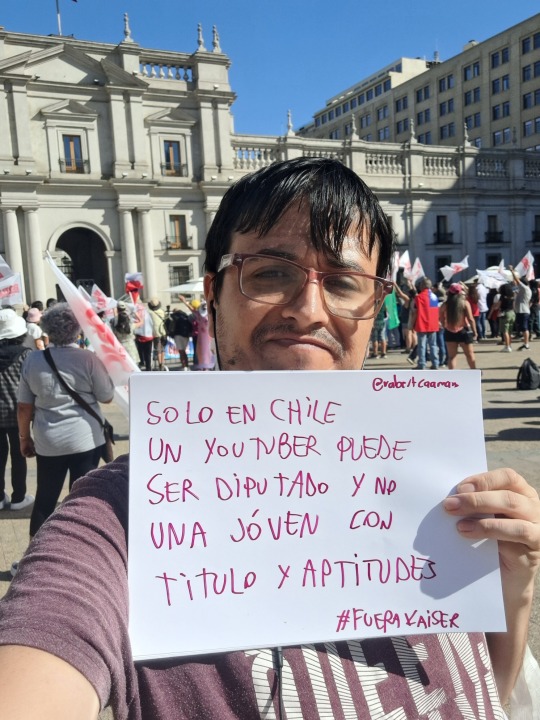
Quienes me conocen, sabrán de sobremanera que este periodo parlamentario, ilegítimo desde sus cimientos, me ha causado más rabias que cualquier otra cosa personal, o de ese "hobby ingrato" que un amigo me definió a la labor que hago en TVenserio.
Me hubiese gustado de frentón que el Frente Amplio fuese mayoría, porque habría encabezado una transformación inédita, como nunca antes hubiese habido en el país. Sin embargo, desde que Andrés Tagle se puso a encabezar el Servel, que definió un parlamento a traje y medida de la derecha, que ha sido obstructora de absolutamente todo.
Eso ha causado, lógicamente, un malestar mental que se ha expresado de diferentes formas. Incluyendo arranques de ira que muchas veces no logro canalizar bien.
Qué duda cabe, este Congreso me ha sacado de quicio. No solo por quienes están ahí, sino por aquellas personas que no están y que, con el paso del tiempo, ha quedado demostrado que habrían marcado la diferencia de forma sustancial.
Y muchas veces lo uso como pretexto para temas personales. Pero en la mayoría de los casos, me da placer mentarles la madre digitalmente por lo que son: Los principales obstructores del progreso social y mental de nuestro país.
Y a pesar de que es un ejercicio legítimo que busca hacer justicia por todos aquellos que tienen que ver desde lejos cómo un grupo de usurpadores daña a las instituciones democráticas de nuestra nación, yo no estoy orgulloso de mi ira. Lo dijo Iñaki Gabilondo a su equipo en la Cadena Ser en 2004 cuando los arrebatos de José María Aznar lo hacían enojar.
No puedo sentir orgullo de todos los enojos que me ha dado gente como Johannes Kaiser, Chiara Barchiesi (que aún no me explico por qué ella sigue en su testera, cuando debió ser destituida por el TER por notable abandono de deberes), Cristian Araya, Gloria Naveillán y tantos otros que han creado la que yo llamo "la bancada del bullying".
Tampoco puedo sentir orgullo de las veces que el Congreso se manda una cagada, como una reforma que rechazaron siquiera la idea de legislar, y es tal la pena que he ido al Paseo Bandera a llorar desconsoladamente, no solo por ello, sino porque si al Frente Amplio no le hubiesen robado la elección, las cosas hoy serían completamente distintas.
Este Congreso me tiene con psicólogos, con terapia, con un deseo de que sea cerrado y que Boric gobierne por decreto hasta 2026.
Por ahora, sigo pasando rabias, sigo llorando, sigo lamentando que Nicole Martínez esté en su casa viendo por televisión, llorando desconsoladamente, cómo un grupo de personas daña a un organismo que debería ser un faro de debate sensato. Y de eso no puedo sentirme orgulloso. Por ningún motivo.
2 notes
·
View notes
Text
[🌹]: who willingly puts a tattoo on their EYELIDS?? isn't that like very painful?💀
also, WHAT ABOUT NAGI??? AND REO??
Thank the heavens above

#blue lock#bllk#bluelock#bachira meguru#meguru bachira#alexis ness#ness alexis#michael kaiser#kaiser michael#nagi seishiro#seishiro nagi#mikage reo#reo mikage#ira's thoughts
154 notes
·
View notes
Text
LAS CRÓNICAS DE MARTE (Capitulo 5: La Gran Guerra)
Capitulo 5: La Gran Guerra En la Europa de la Gran Guerra en 1918, en lo que los aliados llaman “La Tierra de Nadie”, un campo lleno entre trincheras aliadas y alemanas, lleno de muertos, alambres de púas y lodo, donde las ametralladoras alemanas pasan por encima de todo, se encuentra en la trinchera aliada, el joven John Martensen, descendiente lejano del guerrero romano Marte y soldado del ejercito aliado, atento a la escasa oportunidad que le dan las ráfagas de las ametralladoras alemanas para cruzar “La Tierra de Nadie”, a su lado varios soldados, algunos tan atentos como el y otros llegando al punto de la locura, la distancia entre trinchera y trinchera era de cientos de yardas, a penas un soldado podía ver a su enemigo como un punto en el horizonte, en la trinchera aliada, John observaba atentamente esperando alguna acción de los alemanes, en ese momento, este descendiente del guerrero romano Marte escuchaba los cañones alemanes haciendo ruido a kilómetros de distancia, se convirtió en un instancia de meditación, hasta que el oficial a cargo llamo a un voluntario para darle una misión, los soldados aturdidos por la experiencia no respondieron rápidamente, pero John si respondió, en el refugio, el oficial encargo a John ir al puesto norte y entregar una carta lo más rápido posible, al rato, John sale corriendo mientras los cañones alemanes que dispararon a la distancia bombardean la trinchera.
En unos minutos, John sigue corriendo por un camino solitario, cerca de ahí, encuentra a un soldado alemán muerto al lado de una bicicleta, a la vuelta de un matorral encuentra el puesto, pero nota algo extraño, la puerta del puesto esta abierta, hay un poco de humo y olor a pólvora, el joven soldado esta alerta, entra con mucho cuidado y encuentra al oficial a cargo del puesto, moribundo, este le dice: “aléjate,…es...una...trampa…”, John se da cuenta que es tarde y ve que un soldado alemán de mediana estatura y un bigote Kaiser le apunta con un rifle Mauser, el soldado le dice en su idioma: <¡¡levantante, cobarde, levante!!>, John hace que se rinde y apenas suelta su arma, se da vuelta y le pone una zancadilla al alemán, este con una cara rabiosa y de ira le pone resistencia, en ese momento John nota que el soldado alemán mira hacia un lugar del puesto y ve que se activo el detonador de una bomba de tiempo, ambos dejan la pelea y salen del puesto, en ese momento, el puesto explota lanzando a ambos por el aire, ambos se levantan aturdidos y se ponen en guardia boxeando uno contra el otro, antes de que empezaran con un segundo round, John le da un golpe que lo deja aturdido. Al rato después, John toma prisionero al alemán y lo arrastra por el suelo, en su rostro siente bastante disgusto por arrastrar a un prisionero de guerra enemigo, cuando llega a la trinchera notan que las ráfagas alemanas de las ametralladoras alemanas mantienen las cabezas de los soldados aliados pegadas al lodo, John llega al puesto y se reporta con su oficial a cargo y le dice: “Soldado Martensen reportándose, señor, todos muertos en el puesto, logre tomar un prisionero…”, el oficial a cargo mira tristemente al prisionero y después a John y le dice: “lamentablemente, ya no vale la pena,…acaban de anunciar que Alemania firmo el armisticio, la guerra termino”, de repente el soldado alemán despierta y con mucha energía se enfrenta a sus captores hasta que uno de los soldados del puesto le hace una llave y lo neutraliza. Al poco rato, los soldados de ambos bandos en “La Tierra de Nadie” salen de sus trincheras, intercambian prisioneros y el alemán capturado por John sigue amarrado y todo rabioso, el oficial alemán da una orden a prisionero alemán como si fuera un perro: “<¡¡Cabo Hitler, venga acá, la guerra termino!!>”, de un solo zamarreo lo sueltan y el Cabo Hitler camina todo enojado a la trinchera alemana, en un momento, se sienten un silbido en el aire y empiezan a caer bombas de gas mostaza, el alto al fuego no llego a todos los puestos, rápidamente los soldados se ponen las mascarillas antigases, algunos soldados no alcanzan a ponerse la mascarilla y al aspirar el gas, se revuelcan en el suelo, incluyendo al Cabo Hitler, John tampoco se salva y se desmaya.
Cuando John despierta se da cuenta que esta en un hospital y al darse cuenta que el gas mostaza no lo mato dice: “¡¡Jesús!!, debí haber matado a ese perro rabioso….”



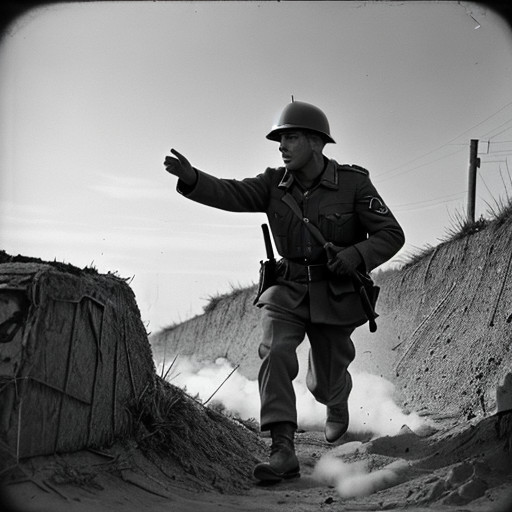
5 notes
·
View notes
Text
Ultimate Muse List
P.S.A.: This post is not meant to be reblogged nor even replied. For this showcases the new changes for my blog as far as muses go and so on. This is applied to here and the @lesinfullgallery (Sinblog) only. For references, bold is both blogs, italic is exclusive to my sinblog and normal only for this blog.
Primary Muses:
Yu-Gi-Oh!: Seto Kaiba
Yugi Muto
Aki Izayoi
Jack Atlas
Judai Yuki
Asuka Tenjoin
Ishizu Ishtar
DMG
Mokuba Kaiba
Kaiser Ryo Marufuji
Star Wars: Darth Vader
Anakin Skywalker
Ahsoka Tano
Shaak Ti
Obi-Wan Kenobi
Darth Sidious
Darth Tyranus
General Grievous
Asajj Ventress
Bo-Katan Kryze
Darth Talon
Aayla Secura
Luke Skywalker
Dragon Ball: Artificial Human #18
Piccolo
Son Gohan
Oob
Vegeta
Seripa
Vegetto
Fate: Saber!Artoria Pendragon
Ruler!Artoria Pendragon
Shirou Emiya
Senji Muramasa
Gilgamesh (Archer and Caster)
Rider!Medusa
Saber!Nero
Lancer!Enkidu
Lancer!Bradamante
Saber!Musashi
Scathach (Lancer)
Rin Tohsaka
DC Comics: Batman
Wonder Woman
Kara Zor-El/Supergirl
Catwoman
Poison Ivy
Raven
Cassandra Cain
MARVEL Comics: Thor
Wolverine
She-Hulk
Amora
The Hulk
X-23
Dr. Doom
Avatar TLA/LOK: Azula
Korra
June
Mai
Katara
Code Geass: Lelouch Vi Britannia
Cornellia Li Britannia
C.C.
Kallen
Naruto: Sakura Haruno
Ino Yamanaka
Sarada Uchiha
Tsunade Senju
Final Fantasy: Tifa Lockhart
Jesse
Akame Ga Kiru: Akame
Esdeath
Leone
BNHA: Katsuki Bakugo
Mirko
Shoto Todoroki
Momo Yaoyorozu
Eijiro Kirishima
Other Characters: The Rowdyruff Boys
Mandy
Medaka Kurokami
Satsuki Kiryuin
Riku
Erza Scarlet
Yoruichi Shihouin
Secondary Muses: Fate: Rider!Achilles
Berserker!Heracles
Caster!Xuanzang Sanzang
Assassin!EMIYA
Assassin!Cursed Arm Hassan
Assassin!King Hassan
Lancer!Karna
Rider!Iskandar
Rider!Saint Martha
Archer!Euryale
Tine Chelc
Assassin of Red!Semiramis
Yu-Gi-Oh!: Kaito Tenjo
Tyranno Kenzan
Rio Kashimiro
Kowora
Star Wars: Darth Maul
Jaina Solo Fel
Lord Starkiller
Barriss Offee
Asajj Ventress
General Grievous
Plo Koon
Kit Fisto
Lumiya
Galen Marek
Avatar TLA: Suki
Ty Lee
Kuvira
Asami Sato
Toph Bei Fong
Dragon Ball: Nappa
Tenshinhan
Mr. Popo (TFS)
Broly
Towa
Android 17
Android 16
Kefla
Code Geass:
Rakshata
Nunnally Vi Britannia
DC:
Big Barda
Cyborg Superman
Harvey Dent/Two-Face
Doomsday
Bane
Final Fantasy:
Lightning Farron
Emperor Mateus
Sephiroth
Noctis
Kefka Palazzo
Other Male Characters:
Syaoran Li (CLAMP Multiverse)
Omniman (Invincible)
Mark (Invincible)
Hiei (Yu Yu Hakusho)
Kill La Kill:
Ira Gamagori
Uzu Sanageyama
Hoka Inumuta
Nonon Jakuzure
Naruto: Tenten (Naruto)
Mei Terumi (Naruto)
RWBY: Pyrrha Nikos
Ruby Rose
Sienna Khan
Winter Schnee
Kingdom Hearts: Xion (KH)
Larxene (KH)
Disney: Jasmine (Aladdin)
Esmeralda (HOND)
Mulan (Mulan)
Pocahontas (Pocahontas)
Exclusive Muses to my sinblog: Chel
Nemona
Nessa
Mai Shiranui
Samus Aran
Rias Gremory
1 note
·
View note
Text

i hate slick and pretty things. I prefer mistakes and accidents. Which is why i like things like cuts and bruises – they're like little flowers. I've always said that if you have a name for something, like 'cut' or 'bruise', people will automatically be disturbed by it. But when you see the same thing in nature, and you don't know what it is, it can be very beautiful.
O trovão marcou o momento em que seus joelhos trêmulos tocaram o chão encharcado pela chuva. A temperatura fria subiu como uma corrente elétrica, como uma serpente, apertando-o, sufocando-o. Era o primeiro de muitos treinamentos, em que Kaiser deveria unificar sua natureza bruxa com a demoníaca, e a Deusa Deméter parecia observar com olhos silenciosos e cruéis. O peso daquele instante esmagava seus ombros curvados, a atmosfera densa corroía sua respiração, que se tornava difícil, não pela dor no corpo, mas pela vergonha de sua fraqueza.
A chuva era constante, castigando-o tanto quanto seus próprios pensamentos pesados e violentos, moldando-o como um martelo a forjar uma espada. Cerrava os dentes, sentindo o gosto amargo do barro que escorria até seus lábios grossos, esbranquiçados e sem vida, assim como seus olhos dourados. Opacos como as memórias de seu passado, refletindo a doce ilusão de sua mãe como um raio de sol, sua risada um eco distante, substituído agora pelas mãos cruéis, outrora suaves, que o puxavam sem piedade do chão. As orbes roxas entraram em confronto com as suas, trazendo tudo o que ele não queria encarar: sua impotência e insignificância.
Kaiser não suportou e desviou o olhar por meio segundo. Não queria encarar aqueles olhos que lhe lembravam que ele era apenas uma ferramenta, uma peça em um jogo no qual não escolhera participar. Mas, mesmo tentando fugir dessa verdade, algo crescia dentro de si, algo que pulsava em seu peito como um tambor. Sua natureza. Seu ódio. A ira consumindo uma alma que um dia fora doce.
A raiva era lenta, profunda e inevitável. O sangue o tornava mais propenso a se perder em seus próprios instintos primitivos: desejo, ganância, ira, luxúria. Kaiser era uma bomba, fruto das piores partes de duas famílias miseráveis. Alimentava-se de almas corrompidas, sua magia era um presente amaldiçoado, mas ser um demônio era sua essência. Suas veias queimavam como carvão incandescente.
Ele não sabia por que lutava. Não sabia se desejava vingança, redenção ou simplesmente o fim. O que seria o fim, afinal? O que teria para ele no outro mundo que não fosse tão doloroso quanto este? Algo dentro de si estava se quebrando, se transformando. O som da chuva parecia agora mais distante, abafado por novos sentimentos.
Se sua vida não lhe pertencia, o que sobrava? Se ele não era nada além de um instrumento, então, ao menos, faria o mundo sentir a sua fúria.
1 note
·
View note
Text
THIS IS KILLING ME. this is so lore accurate of me to do i'm dying

HELP WAIT IT WAS KAISER'S BIRTHDAY YESTERDAY ON CHRISTMAS????????? AND I DIDN'T EVEN KNOW????? THIRSTING FOR HIM LIKE A FOOL ON THE DASH CLUELESS... LMFAOOOOOOOOO
16 notes
·
View notes
Text



༉ ˚ . about me and this blog ༉ ˚ .

BLOG:
༉ ˚ . this is a multi-fandom blog, so expect very random and mixed posts.
༉ ˚ . my current fandoms are:
anime- blue lock, my hero academia, oshi no ko.
books- harry potter.
movies/tv shows- bridgerton, modern family
༉ ˚ . i don't usually post nsfw/disturbing content but if i do, there will be warnings/mdni put on top of the post.
༉ ˚ . these warnings will tell you about: curse words, nsfw content, anything of that sort that may be uncomfortable or disturbing for other people.
༉ ˚ . similarly, warnings will be added if there are spoilers to anime/books/manga in any post.
ABOUT ME:
⋮ 彡 you guys can call me ira.
⋮ 彡 my pronouns are she/her and i am a student, so i may not always be active. but i do have lots of free time in my hands lately, so i will be posting a lot, or not at all.
⋮ 彡 if you want to be moots, we can be moots! i love meeting new people and making friends, so don't be afraid to reach out :)
⋮ 彡 since we're getting to know each other, here's a list of all my favorite things in life:
chocolate, rainy days, winter months, coffee, books, anime and manga, the color red, late nights, long car rides, roses, the smell of coconut butter, music, learning new languages, hanging out with friends/family, travelling, cats, flowers, fantasy.
⋮ 彡 and a list of all my hated things in life:
people with trash behavior, hot weather, tight or uncomfortable clothing, fish, matcha, all sorts of insects (especially roaches), miscommunication, procrastination, the color orange, bed hair, vanilla, red velvet, cheesecake, the feeling when you're eating something delicious and you bite on a cardamom.
⋮ 彡 and since no about me post would be complete without my kinnies, here they are:
draco malfoy
tom riddle
cardan greenbriar
aaron warner
jacks
itoshi sae
itoshi rin
nagi seishiro
michael kaiser
tomioka giyuu
todoroki shoto
haruka sakura
hayato suo

divider by: @vesearartistry
0 notes
Note
do you think you're ever gonna get a girlfriend/wife?🤔 i mean, with that attitude, your chances might be plummeting. although, you do need someone to put you in your place.
oh, shut up. are you saying I can't get into a relationship? ... I'm positive I can get a partner despite the... pride.
#[ kaiser's asks ]#[ kaiser and ira ]#bllk rp#blue lock rp#blue lock roleplay#bllk roleplay#ooc -> he said partner instead of girlfriend/wife :3 details!
15 notes
·
View notes
Text
@caeliuris

-- Hey Lucina ¿Estas ocupada? Me gustaría que me acompañaras al mercado, iré a hacer unas compras y...

y-y no quería ir solo --
#ira a comprar vasijas y misellaneos#para que chrom las vuelva a romper (?)#caeliuris#Summoner Kaiser
1 note
·
View note
Text
A dark money group is lying about Medicare cuts
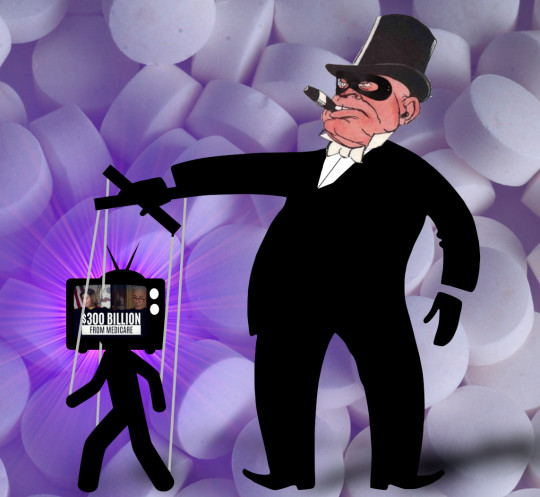
The “American Prosperity Alliance” does not exist, except as an anonymously controlled bank account that has paid for the production and dissemination of a slick ad that spreads the falsehood that the Democrats have cut $300b from Medicare:
https://www.youtube.com/watch?v=-xCep6NvbhE
Let me repeat: this is a lie. What “American Prosperity Alliance” is talking about here is a provision in the bill that allows Medicare to negotiate drug prices, rather than simply paying whatever Big Pharma wants to charge. This practice is why Americans pay more for their drugs than, say, Canadians:
https://personalimportation.org/dramatic-drug-price-differences-canada-vs-us/
To be clear: the new bill will curb the eye-water public price-gouging that Big Pharma enjoys, and halt the transfer of $300b in public money to pharma companies’ shareholders, by allowing Medicare to bargain to get prices similar to those paid by other governments in countries like Australia, Canada, and the UK.
There is no universe in which this a $300b cut to Medicare. It’s like the Dems have pledged to halt $300b in fraud and the American Prosperity Alliance went to the country’s elderly and sick and screamed: “They’re cutting your benefits!” In fact, it’s not like that — it is that.
Who the fuck are the American Prosperity Alliance? No one knows. They’re a dark money group. Their website consists of a link to their deceptive ad, a form to sign up for their mailing list…and nothing else.
https://prosperityalliance.org/
As Lou Jacobson writes for Politifact/Kaiser Health News, this is just the latest version of a torrent of dark money disinformation that makes this claim.
https://khn.org/news/article/senate-reconciliation-bill-300-billion-medicare-drug-price-negotiation-fact-check/
For example, the West Virginia TV ad from the Center for Innovation and Free Enterprise (CIFE) in which an elderly woman was literally condemned to die by her doctor, who explained that it was all because the Democrats were going to negotiate drug prices:
https://www.huffpost.com/entry/drug-companies-trying-to-scare-seniors-democratic-economic-plan_n_62ec6823e4b09fecea4c8dbb?9t
(CIFE claims to be for “free markets,” which, apparently, is a system whereby a cartel of multinationals who rely on government-issued monopolies — AKA ‘patents’ — get to demand literally any sum from the federal government and are assured of receiving it.)
As Kevin Robillard and Jonathan Cohn wrote for Huffpost, similar claims came from “America Next,” “American Commitment,” and “The 60-Plus Association” (which is like a far-right prepper version of the AARP). All of them have historically taken money from Phrma, the lobby group for Big Pharma.
The disinformation would be laughable if it wasn’t so depraved. Telling old people that giving Medicare an extra $300b to spend on patients is a $300b cut to care is straight-up lying — and thanks to the Supreme Court’s Citizens United decision, the dark money cowards funding the American Prosperity Alliance get to lurk in the shadows. If they’re so committed to “American Prosperity,” why do they need to disguise their identities? Is it that they are planning a big reveal later that we’ll all be delighted by and they just don’t want to spoil the surprise?
The irony here is that the Medicare spending curbs in the Inflation Reduction Act are incredibly weaksauce, barely denting pharma’s profiteering. As Thomas Neuburger writes, this only kicks in as of 2026, and it only affects ten drugs.
https://neuburger.substack.com/p/the-ira-drug-price-victory
Neuburger is citing a summary from The Hill, which adds that this provision only applies to drugs that are have been around for at least nine years (13 years for biologics):
https://thehill.com/homenews/3592694-heres-whats-in-the-inflation-reduction-act-the-sweeping-health-and-climate-bill-passed-sunday/
The number of affected drugs climbs to 20 after another five years. That means that, starting in a decade, Medicare will be able to negotiate prices on 20 drugs — out of 20,000. This plan won’t bring down the prices of the most notoriously jacked-up medicine, including insulin, Eliquis, and Humira, a drug that was repeatedly re-patented through useless “formulation changes” that were designed by McKinsey, who designed a program that gave away Iphones to Abbvie scientists who came up with useless molecular changes as part of a perpetual patent scheme:
https://pluralistic.net/2021/11/25/strikesgiving/#cool-story-pharma-bro
In other words, Big Pharma has given up almost nothing in this bill, and they are still running around, lying their heads off like they had just been nationalized by Party Secretary Biden and had all their top scientists sent north to work on re-education farms.
Image: Grumpy Puddin (modified) https://www.flickr.com/photos/grumpy-puddin/5161819684
CC BY 2.0 https://creativecommons.org/licenses/by/2.0/
[Image ID: A cigar-chomping plutocrat in a tuxedo and tophat is wielding a marionette; he is wearing a domino mask; the marionette's head is a television; the television is displaying a framegrab from the American Prosperity Alliance's deceptive ad, falsely claiming that $300b will be cut from Medicare, superimposed over the heads of Nancy Pelosi and Chuck Schumer. There is a purple 'supernova' flare effect behind the television. The figure is posed against a background of white pills.]
63 notes
·
View notes
Text
derry girls episode ranking that no one asked for bc i miss it and i’m procrastinating (also s1 episodes have no titles?? so i made up my own) also watch this show pls
1. 1x02 The Chippy
I can’t explain why this is my favorite episode but it just is. I’ve rewatched it so many times and I think the whole Fionnula subplot is absolutely HILARIOUS plus any episode with Uncle Colm is a delight. The chippy scenes make me extremely nostalgic for my summers in Ireland and I think the humor is top notch this episode with a batshit crazy ending.
2. 2x06 The President
The perfect mix of humor and heartfelt imo. The ending with James makes me cry everytime and I feel like this episode shows the friend group’s love for each other so well. The Colm/Joe/Gerry subplot is one of the funniest bits ever on the show too.
3. 2x04 The Curse
Literally not a single moment of this episode that is not hysterically funny. You got Sarah’s dresses, Colm’s stories, Rock the Boat, drug scones, high Granda Joe, “who put 50p in the eejit?”, “am I dead? is this my wake?”, and probably even more that I’m forgetting but I think it’s a strong contender for the overall funniest episode.
4. 2x05 The Prom
This episode makes me SOFT between James taking Erin to the dance, Orla taking Joe, and the final scene. Mae was a really fun one-off character and this episode just has a lot of really funny scenes and great quotes (ex. “is this where all the gays hang out?” and “there’s just nothing that doesn’t suit me!”)
5. 1x06 The School Paper
The wee lesbian episode!! Clare’s coming out feels very realistic and sweet and the final scene of the episode is one of if not the best scenes the show has ever done. There are also just some great little subplots like Mary’s laundry troubles, the wee docket, and Erin’s terrible article ideas.
6. 2x01 Friends Across the Barricade
Oh my god this episode is so good and it’s a testament to how good this show is that it’s not higher up. My mom grew up in Ireland as a Catholic and this is her favorite episode because of how realistic it is with the Catholic/Protestant divide. Every single character has a hilarious plot trying to connect w the Prod boys and Mary’s big bowl??? A flawless episode.
7. 1x04 Children of Chernobyl
Erin and Katya’s interactions are the highlight of the episode by far and the way the girls are so shocked that Katya fancies James lmaooo. I love this episode and Erin’s dramatic ass. Plus Orla and the chocolate fountain.
8. 1x01 Pilot
Feels wrong putting this so low!!!!!!!! It’s such a great introduction to all the characters and their dynamics, plus the setting of 90s Ireland. The Sister Declan scene is perfect chaos.
9. 1x05 The Orange Order
I love how the show portrays very realistic parts of Ireland during the Troubles not only when it comes to the violence and fear but also just things like the Orange Marches. This episode has some of my favorite Joe/Gerry interactions and the whole Michelle subplot w the IRA man is amazing.
10. 1x03 Father Peter
Okay so this episode is hilarious but the reason it is lower than it should be is because the Erin/Peter scenes are sooo painfully cringeworthy to watch lmao. But the whole Mary smirking scene is so good.
11. 2x02 Mrs. De Brun and the Child of Prague
Idk how this ended up so low on my list considering Dead Poets Society is my all time favorite movie but here it is, I still adore this episode. Drunk Clare is excellent and it has one of my all time favorite scenes where Clare’s mum tells her to not even breathe and she just holds her breath all scared LOL I can’t even describe it but it’s so good. Great secondary plot with Kaiser Soze too.
12. 2x03 The Concert
I truly do not think there is a single bad or even subpar episode of this show, every episode is hilarious and insanely rewatchable, this episode probably just has less standout moments for me. The whole suitcase of vodka scene is an all-time great though.
30 notes
·
View notes
Text
The Celtic Tiger - A Kaiserreich Ireland AAR Chapter 2: An American Tragedy
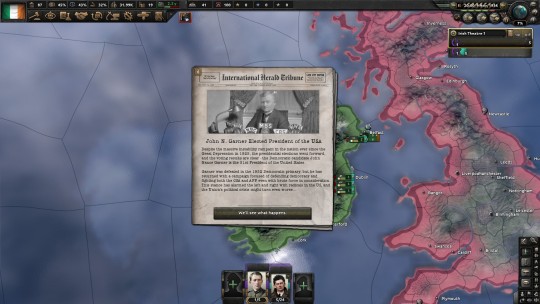
12 February 1937 - Home of Michael Collins, Cork, Ireland
“The United States of America has faced challenges since its founding, but it is an enduring republic. When we were invaded, we fought off our attackers. When the Great Storm hit Galveston, we built cottages from the storm lumber. When Black Monday reached our shores, we passed the Garner-Wagner Act to deliver our people relief. The American people, through this election, have made their will clear. They do not want the empty promises of Jack Reed. They demand more than the sayings of Huey Long. Words are not enough, action is required. That is what I shall promise: action. We will stand firm against the threat of populism and syndicalism.”
Benjamin Franklin, after the Constitutional Convention, was asked whether the United States was a democracy or a republic. His words were: ‘a republic, if you can keep it.’ That was not mere wit, but a charge; a sacred duty given to every citizen. Today we say: it is our republic, and we shall keep it.” -US President John Garner, Excerpt from Inaugural Address
In Michael Collins’s case, war never seemed to have a countdown, but sure enough, the war looked like it would begin in 30 days. Just the thing to ruin his vacation; he had hoped to spend a few days in Cork to recharge his batteries, and ended up having indigestion and headaches the entire trip.
The United States had been a roiling mass of discontent since 1925, but it had only gotten worse during Black Monday. President Garner had won a lot of support in his campaign, which had focused on trumpeting the successes of the Garner-Wagner Act and touting the President’s willingness to fight any who threatened democracy. “A snake is a snake is a snake,” Garner had been fond of quoting on the campaign trail, swaggering with a pair of revolvers. “I plan on working to fix the mess that we’ve found ourselves in. If Jack Reed and Huey Long want their voices heard, I’ll listen to them. If they want prosperity for America, they’ll listen to me. And if they want to fight, they’ll get one. I don’t plan on striking first, but as God is my witness, I’ll be striking last!”
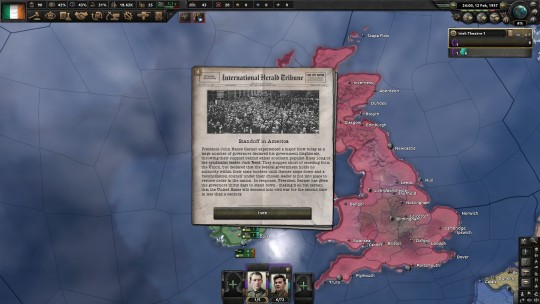
That had been enough for the Presidency. Jack Reed’s Socialist Party of America and Huey Long’s America First Party had strong regional support, but neither movement received enough votes to beat the Republican candidate Alf Landon, let alone Garner. Yet the victory was narrow, and both candidates claimed voting irregularities arranged at the polling places by supporters within the state voting commissions, along with other accusations of beatings and intimidation campaigns. Herbert Hoover endorsed Garner in a show of cross-party American solidarity, and Landon himself was a guest of honor at Garner’s inauguration. Garner had already promised the Republicans some Cabinet appointments in the hopes of building a coalition government strong enough to stop Long and Reed. It was an uphill battle; the 1936 voting season had been marred by political demonstrations turning violent, they had even called it the Red Summer, and now Long and Reed were railing against the legitimacy of the vote.
When the populists had made their accusations, the governors in their regional strongholds had backed Long and Reed. The populists, it seemed, had called President Garner’s bluff. The governors demanded a “national reconciliation council” under their talking head, and both had made it plain that the other would not be welcome on it, making it all but certain that war would come, and it would not be small. Jack Reed was popular in the Steel Belt and Huey Long had an almost religious appeal in Louisiana and in the rest of the Southern United States. Reed had much of the industrial heartland, but Long had far more pull among the military including high ranking officers. It wouldn’t be an easy fight, no matter what Texans had to say. In both ways, it was bad for the United States.
Collins had hoped it wouldn’t be war, but he was sure that it would be. If Jack Reed was able to successfully overthrow Garner, the Internationale would be emboldened. The Communards might still be reluctant to face Germany, given how large such a war would be, but Mosley would almost certainly want to snap up Ireland to carry forth syndicalist momentum. Anti-Irish rhetoric had only intensified in the months following Ireland’s meteoric 1936 rise, with Mosley claiming that Michael Collins had become “every inch the oppressive king he fought against.” Collins laughed when he was first told it, but as the days went on he seethed against the man, wishing he could have five minutes alone in a room with him. He was sure his sainted ma would not look fondly on him for beating on a man with a limp, but she’d forgive him.
When the reporters asked for a quote, Collins was sure to give them one. “Look at Mosley in the war. Gallivanting around in an aeroplane like war was just boys at camp, crashing trying to be a showboat. I suppose I must be kind, he tried to prove he was a brave man, I’m sure it’s not his fault he ran behind a desk before a year was out. That’s where he’s most comfortable, hiding and sipping his gin while he sends young boys to do the fighting and dying.”
Collins had a good laugh, but he made sure to tell his diplomatic service to make sure that Ireland would have plenty of friends on both sides of the Atlantic, just in case the Union tried anything. Laugh in public, but service your pistol in private.
---
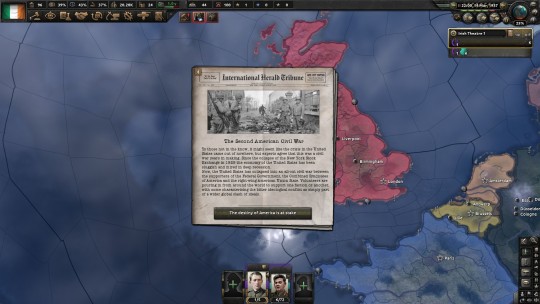
14 March 1937 - Áras an Uachtaráin, Dublin, Ireland
It was war. The entire world was aflutter with the news that the United States had descended into a civil war. President Garner’s deadline had come and went, and both Jack Reed and Huey Long had declared war on the United States. In response, Garner had appointed General George Marshall as Chief of Staff of the Army. The Internationale had already voiced its support for Jack Reed, with Chilean, Communard, and Union supporters already on their way to support the newly-formed Combined Syndicates of America. The German Empire was far more reserved in its support. German-Americans primarily lived in areas controlled by the Combined Syndicates, and the United States government had primarily conducted a pro-Entente policy during the Weltkrieg, leading the Kaiser to support Huey Long out of pure pragmatism. Canada had fallen into debate within the Houses of Parliament on who they were supporting.
Collins had no such reservations about debating who to support in the Dail. Collins had sent out a call for a volunteer division, the 1st Thunderbolts, and had placed them under the command of Daniel McKenna. The East Coast was dense with urban areas, and McKenna was just the man to fight in that difficult urban war, having fought the English in the cities before. The Thunderbolts had been training for months in preparation for the outbreak of hostilities. Most were young men, too young to have seen the Independence War, but their officers and senior NCO’s had. That would carry them, fighting in unfamiliar territory would mean they would have to adapt quickly and rely on the experience of the leaders. Other IRA volunteers, particularly those with families in the United States, had opted to go there themselves, fight in the American army, and return later.
The first target would have to be the syndicalists. With their position in the American industrial heartland, they’d have the manufacturing prowess and the civilian manpower to build and repair war materiel far faster than the mostly rural southern states. They would have to trust in their greater manpower and equipment to hold the southern front against the aggressive generals of the American Union State. The United States had begun mobilizing forces on the West Coast to get them to move east, and requisitioned several rail lines for exclusive military use, but it would be hard fought. America was going to need all the help it could get.
---
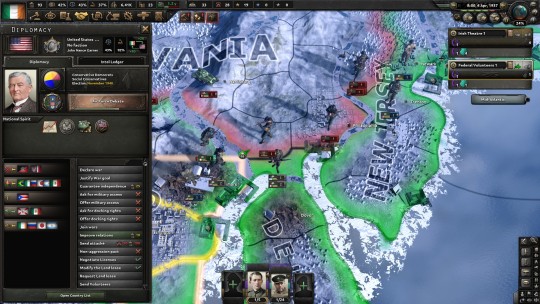
13 April 1937 - Northern Maryland, United States of America
“We have traitors to our left, and traitors to our right
Our Congress and our president have long since taken flight
No ammo, no armor, no pills, no cargo
No prayers, no chance, no hope of tomorrow
Just you and me and a hell of a lot of fight.” -Frank McHewlitt
Pennsylvania had become a battlefield for the Second American Civil War just as it had for the first. The Pennsylvania governor had declared for Jack Reed, but the Federals had made a march into central Pennsylvania, seizing York to Fulton counties, but lack of manpower, difficult terrain, and Communard volunteer tank brigades had ensured any excursion was short-lived. From New York to the Midwest was controlled by the Syndicalists. Fearing being overrun, Joseph Kennedy Sr. had asked Canada to send an occupation force to protect them from the Syndicalists. This had infuriated President Garner, but pragmatists in his Cabinet had argued that the region was indefensible since the Syndicalists held New York, and better that the Canadians occupy it, and the Combined Syndicates risk a war with the Entente, than the factories be taken over by Jack Reed. Further south, Canada had sent a force to occupy the Panama Canal after the Americans had withdrawn their garrison force. The Canadians had said their mission was to protect trade, but had banned ships flying Communard, Union, or Chilean flags.
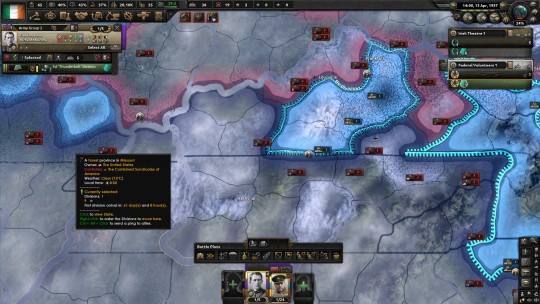
Further south, Texas to the Carolinas, and everything south, had pledged loyalty to Huey Long’s vision. Several companies had even signed on to the “Share Our Wealth” program. His men were heavily-armed and competently led, and they had already made significant inroads pushing north into Kentucky from Tennessee, even making contact with and fighting Jack Reed. George Patton had been named the overall commander of the American Union State, and on land the America First Party had shown themselves to be exceptional fighters pound-for-pound. Their goal had been to push and seize whatever territory they could, to turn the factories over to Longist control and get their war materiel production up to match the Federals and the Syndicalists. It had been remarkably successful, Patton’s armor techniques had run circles against disorganized Kentucky militia and revolutionary syndicalists alike. Already there were unconfirmed reports of mass shootings of CSA prisoners by AUS irregulars. The Federals were hard-pressed, often surrounded and potentially encircled by hostile forces in Kentucky. Only the chaos of the war and the close proximity of all three forces, kept them from being killed outright. Desertions, particularly from militia unfortunate enough to be in the encircled regions, were high.
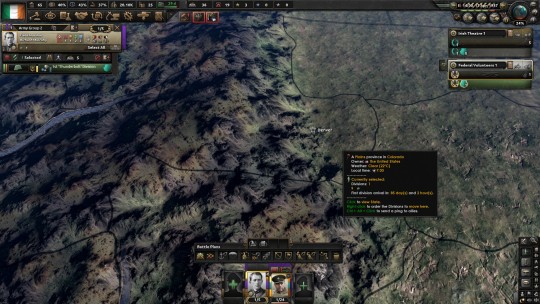
Washington was no longer the capital. With Maryland under fire and the Firsters pushing from the south into Virginia, Garner had decided to temporarily move the capital to Denver, where he could oversee the political business of state. MacArthur had elected to remain in place as the commander of the East Coast Enclave, suggesting that Dwight Eisenhower take command of the main Federal forces in the Midwest. “He’s a Kansas man, there’s no man better in command from the Midwest. The troops will fight tougher and harder if they know we haven’t abandoned them. Don’t worry, Mr. President. Those bastard traitors won’t set a foot in D.C.” With his trademark corn cob pipe and a wave to the press, MacArthur took a ride on a Vultee V-1 to take up command, with Eisenhower being named the overall commander of Army Group West, with the goal of pushing east from Kansas into Missouri.
MacArthur welcomed the service of the volunteers sailing and landing on the Chesapeake, no traitor forces had been able to ensure naval supremacy on the East Coast and none were willing to risk firing upon a flagged vessel and invite any nation’s full-blown entrance into the conflict. Lavr Kornilov, eager to project strength and stability after the assassination of President Kerensky. Hirohito had also dispatched volunteers citing the strong relationship between the United States and Japan and the need for legitimate government to be re-established in the United States to project stability in the Americas. Calles in Argentina, eager to re-establish the Monroe Doctrine to act as a bulwark against the Patagonian Worker’s Front, and always eager to fight syndicalists. Brazil likewise had ordered troops to support the United States. Mexico, eager to avoid any war spilling over their borders, had closed the borders to the American Union State and had sent divisions through the Gulf of Mexico before the Longist navy could seize control of the waters and potentially cut off trade and transit. MacArthur ensured that each division had several bilingual Americans to serve as liaisons and communications personnel. He couldn’t command the volunteers, but he did demand adherence to military law and that any abuse of US civilians or military personnel would be dealt with by firing squad. Similarly, MacArthur promised his own men that they would be punished harshly if they stole from or fought with Federal volunteers. Regular correspondence was mandatory, and passwords changed regularly to allow foreign soldiers to identify themselves quickly to friendlies, passed via radio operators who had signed up with the Federals in record numbers when President Garner forced a bill and executive order expanding the civil rights of Native Americans to shore himself up for the upcoming emergency. The Navajo Nation, who provided one of the largest units, dispatched signals operators to coordinate with the volunteer brigades, providing exceptional communications security and coordination between the Federals on both fronts.
Yet things were not going well. MacArthur had enforced military law within the East Coast enclave, and garrison forces frequently looked to seize supplies and materiel for their war effort. Oftentimes, a token effort at compensation or promise of restitution to come later was the only balm in Gilead; it did not help those who starved.
The volunteer forces moved north to the Mason-Dixon line, where the Combined Syndicate militia were threatening to move south into Maryland from their regional headquarters in Philadelphia. The Russians opted to secure themselves in Baltimore, while the Argentine and Mexican forces moved to Cecil County to secure Delmarva from the syndicalists seizing the east bank and potentially cutting off vital access to the Chesapeake. McKenna and the Irish 1st Thunderbolt, acting aggressively, crossed into Pennsylvania and secured themselves in York. Not willing to pass up a fight, Russian and Irish volunteer brigades pushed into Lancaster County, threatening Philadelphia and forcing the Communards to reinforce their position lest Philadelphia fall and the road to New York be pushed wide open.
---
17 April 1937 - Economic Committee of the Dail, Dublin, Ireland
It had been a constant flurry of activity in the new year. The Dail was debating loosening immigration restrictions to help bring in new blood to help support Ireland’s effort to modernize. Even if good policy and hard work had led Ireland out of the depression following Black Monday, manpower was still the hard limit on everything they could do. Once unemployment fell, there would be no new employees for businesses, and they’d turn away from Irish investment.
There had been two major sources of pushback against immigration reform. The Unionists in Ulster had been vocal opponents, calling the efforts part of a planned demographic shift to stock the north with people that would sideline their concerns as Unionists. Their proposal had instead suggested an increase in immigration from select countries, notably Canada, Australasia, and the British Dominion of India. Gearóid Ó Cuinneagáin was far more hostile to immigration overall, demanding no immigration save from Celtic-majority countries, particularly those who wished to depart the Union of Britain from Scotland and Wales. Some of the measures proposed had truly been radical, such as instituting a Gaelic language entrance exam to new immigrants. The hAiséirghe crowd had always been a touchy subject, they had enough support in Munster that they couldn’t be ignored as much as Collins wanted to throw the bastards into the ocean.
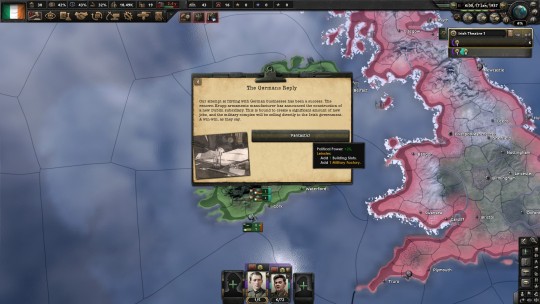
Collins had been lucky, his Dublin financial capital idea had already been receiving positive responses. The German Kaiserreich, still deep within the throes of Black Monday, had debated whether or not to permit German businesses to invest in Ireland. The protectionists in their government had argued that the last thing that they needed to do was open up subsidiary companies in Ireland and send work away from Germans. The market liberals were far more enthusiastic, suggesting that the profits made could be reinvested in Germany; an influx of cash that wouldn’t increase the money supply and devalue the Mark. In the end, Wilhelm II had agreed to the proposal. He had known that the Irish Republican Army had been looking to re-equip their forces, and Krupp could easily manufacture rifles and mortars with a sizable government contract. Krupp opened Krupp Rüstungsbetriebe Irland, redesigning the Krupp Radreifen into the shape of a shamrock.
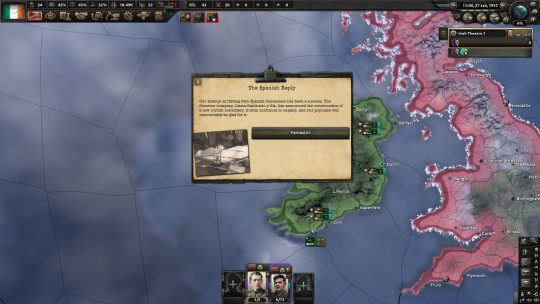
The Kingdom of Spain had also looked to establish an arms company in Ireland, eager to arm those who were also hostile to the syndicalists, and quite isolated on the European continent, with France and the German Protectorate of Morocco making an uneasy set of neighbors. Having a well-armed Irish Republic was a benefit to King Alfonso, who agreed to set up a subsidiary of Llama-Gabilondo y Cia SA, taking the name Dóiteáin-Gabilondo Incorporated, and selling their famous pistols to the Irish Republican Army. With regular army drills, and now a larger armaments industry within Ireland itself, a more significant and professional Irish Republican Army was starting to take shape.
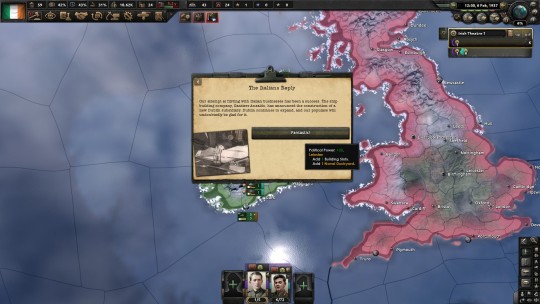
The Italian Republic, floundering in the wake of massive German and Austrian stock selloffs, were eager to find ways to bring in cash and stabilize their own economy. Seeing a pressing need, the Italian Republic opted to establish a naval manufacturing dockyard in Dublin as Gio Ansaldo Irish Sea Shipwright, Ltd, to help produce submarines for the Naval Service. Italian engineers could work in Ireland, the revenue would flow into Italy, and the Irish would receive a powerful deterrent against the Union of Britain’s navy. Working in the choppier northern waters was different from the warmer and calmer Mediterranean, but the Italians proved up to the challenge, christening the first Irish U-Boat the new Fenian Ram.
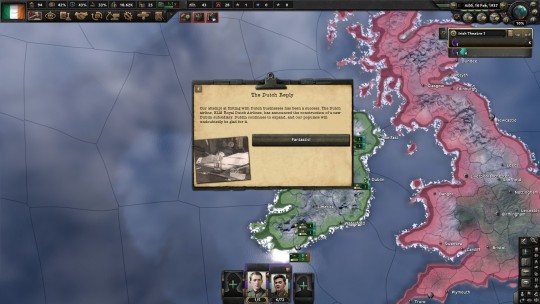
The rush of European activity to invest in Ireland had not gone unnoticed in the Netherlands. After a fierce and competitive bidding war, the Dutch government, very busy with their preparations for the upcoming elections in May, had given the go-ahead for Royal Dutch Airlines KLM to do business within Ireland. Rather than operating a strict subsidiary, as the government was still facing the worst of Black Monday, Royal Dutch instead opened a joint venture with Aer Lingus, operating a civilian airfield that would bring in much needed tax revenue, and providing expertise for the construction of a military airfield in Leinster. The Union of Britain had lodged a formal complaint against the move in the Netherlands, but the ambassador had been dismissed out of hand, the official response being “Ireland has a right to the sky, and Britain has no right to dictate policy to the Netherlands.”
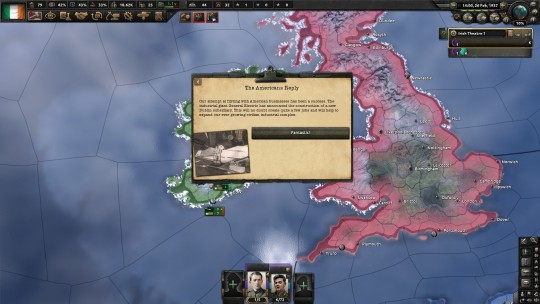
The United States had been considered highly unlikely to invest in Ireland. Even with the positive relationship that had existed between the two countries, the USA had been facing an existential crisis. To Collin’s great surprise, Garner had actually encouraged American companies to open subsidiaries in Ireland before hostilities broke out. In a diplomatic message to the Irish President, Garner had written: “I am certain there will be war. American industry will certainly not be spared. This initiative may save American lives and enrich both our countries. If the worst comes to pass, may God protect us both.” General Irish Electric, as the company titled itself, designed a logo incorporating the Irish harp in the signature “G” of the GE logo. The company received a grant from the National Industrial Investment Fund and purchased a factory abandoned during the Black Monday fallout, bringing up to speed in record time to produce civilian and industrial-grade electronics. Almost immediately, GIE had orders tasked almost to capacity for factories across Ireland to upgrade their own operations, throwing itself into the greater industrialization efforts that Michael Collins had championed the previous year.
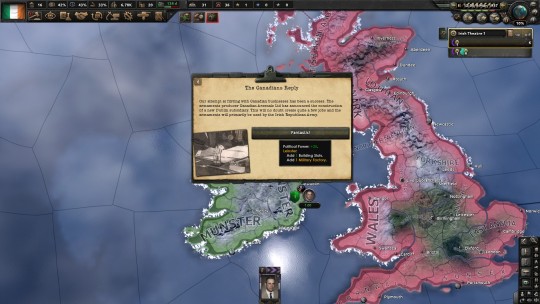
The Dominion of Canada was a much more difficult beast to wrangle. Edward VIII had made no secret that he wished to reacquire not just the British Home Isles, but the British Empire as well; he would not be a second-fiddle to the Kaiser. That would mean the Six Counties, surely, perhaps even re-establishing the Free State as a Dominion. Collins had debated even making the offer to Canada, but a good relationship with Canada was, putting Edward aside, a sound policy. Canada needed money to support their war efforts, and a friendly relationship with Ireland would mean less problems when launching their operation to take back the Home Islands. Collins privately feared that they would want to use Ireland as a staging ground. Ireland had situated itself as a prominent financial hub, and since Dublin was designated a Special Economic Zone, it could potentially be very lucrative and offer a way to sell to the rest of Mitteleuropa without dealing with the Kaiser. The Canadian government had assented to Canadian Arsenals, a crown corporation to open a subsidiary in Dublin named North Atlantic Arms. Collins made sure that it acted in all things as a private company, insisting that King Edward appoint an executive staff the same as any other business. That had been a headache in the Dail, with Eamon de Valera angrily demanding not to sell Irish land to King Edward. Collins had countered that Ireland was a free and independent republic, and that the King had to obey Irish law rather than dictating laws to Ireland.When rumors came around that Jim Larkin had supported Dev’s objections, the Fianna Fail politician withdrew his opposition in favor of a more moderate compromise, asking only that the Dail be presented the terms of the contract in open session so that they could vote on them. Dev’s desire not to give Larkin more ammunition had rapidly diminished opposition to the measure within Fianna Fail, and Sinn Fein offered only a token dissent, permitting the venture to go forward.
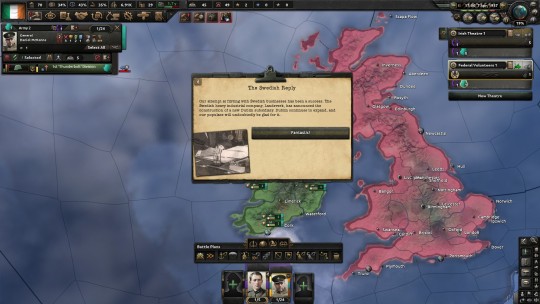
With the outbreak of war in the United States and Ireland’s rapid industrialization, Sweden had sensed an opportunity to open a subsidiary business in Ireland as well. AB Landsverk had originally sought to open a tank manufacturing plant, since the Irish tanks were largely outdated and the Irish Republican Army was going to need to modernize its arsenal. Fierce protest erupted from the social democrats within Sweden’s Parliament, opposing the idea of arming Ireland and facilitating a possible war between Ireland and the Union. The hawks within Sweden had supported the venture, but military arms, even support equipment, could not secure a large enough coalition for the Economic, Defense, and Foreign Ministers to agree to the venture. Not wanting to lose out on the potentially lucrative deal and already facing their own problems with syndicalist unrest, Sweden’s market liberals had offered a compromise within the Riksdag, allowing Landsverk to open Landsverk Inneal, specializing in tractors and harvesting equipment to support the modernization of the Irish agricultural sector. Several prominent military analysts noted that the new Inneal tractors, with a few modifications, looked suspiciously similar to a light tank with the turret removed, but these were dismissed as products of an overactive imagination by both Swedish and Irish military analysts.
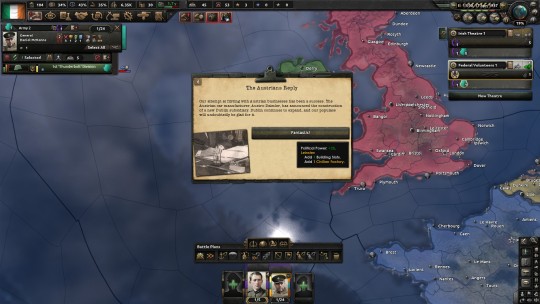
The Austrian Empire was in a difficult position in 1937. Emperor Karl I had been making significant plans for his Ausgleich Federation plans, and saw the Irish initiative not simply as a means to support his economy, but as a means to demonstrate both Austrian power and his willingness and initiative to support cooperation efforts for mutual gain. The Emperor had made his commitment to pluralism plain within his proposed federative model, he had hoped that participating in Collin’s economic initiative would help sway skeptics and naysayers to his side to give him greater support against Hungary. If it could help his economy and put neutral voters who cared more about their own personal livelihood than the greater plans of Austria-Hungary, that was fine as well. Daimler founded Irish-Daimler and focused on developing automobiles and lorries. While the Emperor could not be there in person, he had prepared a statement for the opening of the plant in Dublin. “Irish-Daimler is in the business of Irish business. Her success is our success, and our success is her success. May we both prosper in the days ahead.”
Eight nations had opted to do business with Ireland in such a short period of time, and there had already been murmurs for other nations to do likewise. The success of Irish Black Monday reforms had been the talk of the European financial sector. Even distant Japan had expressed an interest in perhaps opening a branch of one of their zaibatsus in Ireland to sell to Western markets, though such a discussion was in the planning stages. When interviewed by The Financial Times, Lemass had made the quote that had made the headlines. “Ireland is the Emerald Isle. She always sparkled in our hearts, now everyone can see it.”
When Michael Collins had heard that, he smiled. The man had the head of a businessman but the heart of a poet. The head and the heart needed to complement each other if he wanted to see Ireland through.
---
8 May 1937 - Áras an Uachtaráin, Dublin, Ireland
As the war passed into its third month, Collins started to wonder about the upcoming elections in the fall. America had been on his mind a lot lately. An emergency act by the Oirechtas called the Díodean initiative had allowed Americans seeking refuge to come to Ireland, and plenty had taken Collins up on his offer. Many immigrants came with much of their wealth with them, which had provided an influx of capital. Even more valuable, however, was the technical knowledge. Many of the immigrants had been factory managers or entrepreneurs, and they had knowledge which made them highly valuable in the industrial sector. Not every tale was so fortunate, however. Some culture shock was perhaps inevitable, but it had been incredibly slow going. Collins had remembered the first time he saw a new settler to Ireland drive on the wrong side of the road and cause a car accident. This felt like seeing that unfold in slow motion on a national scale. The poor Americans had felt the Irish were cheating them out of wages and exploiting their desperate circumstances, while the wealthy felt their standard of living drop precipitously.
The hAiséirghe crowd again troubled him. Reports of nativist gang uprisings in the poorer parts of cities and rural areas were on the rise. There were demonstrations that the new arrivals were stealing all of the good-paying jobs; this had been going on since the new immigration reform but now was reaching a fever pitch. The Unionists again rallied against Collins, accusing him of colonizing the north with people opposed to King Edward under the guise of humanitarian aid to defeat the Ulster Unionists at the ballot box. They demanded a series of refugee and work permits that did not confer voting rights as opposed to outright immigration and naturalization. That had caused a firestorm on the debate floor, causing no shortage of headaches for Collins.
To alleviate the shortages, Collins had organized refugee brigades in the Republican Army, where young men could earn a wage and provide a livelihood for their families. The Yanks were excellent shots, and Collins had hoped that seeing immigrants wearing a uniform would cause the locals’ respect for the military to undermine nativist tendencies. It was a mild success at best, mostly in Leinster where there had already been fewer problems overall. Collins had weighed outright banning the Ailtirí na hAiséirghe, but that would just send them underground like the Labour Party had. He had to settle for punishing assaults when they were reported, and increasing Gardaí patrols to keep the peace.
In the leadup to the elections, Collins had seen cracks start to form in his ironclad voting bloc. While syndicalism had little popularity in Ireland itself, Sinn Fein had seen an upsurge in popularity with Black Monday despite Collins’s efforts. The Irish Christian Front and the Ailtirí na hAiséirghe had campaigned against him thanks to his immigration policies. Fianna Fail had campaigned on greater liberalization, and the National Centre Party had wanted to re-orient foreign policy to a more pro-Entente position. Sinn Fein and Fianna Fail had opted to engage in tactical voting, with candidates withdrawing from ballot races in order not to split the vote. Jim Larkin had endorsed the move, promising to work with Sinn Fein to provide greater relief to the Irish working class. The Irish Christian Front opted to boycott the elections and both they and the Ailtirí na hAiséirghe accused Collins of bringing in foreign refugees to ensure he had the votes needed to win.
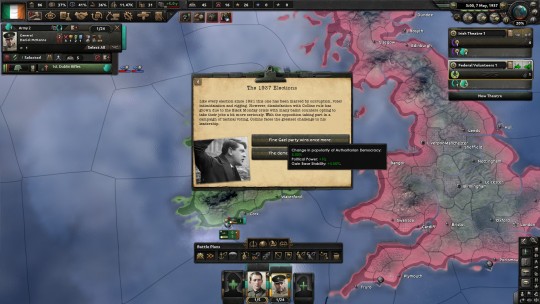
At a closed door meeting, Collins was asked a simple question. “Sir, what should we do about the election?”
Collins, his hands shaking, had only one response. “Whatever it takes.”
---
15 July 1937 - West Virginia, United States of America
“We’re in the right thick of it now, ain’t we?” Daniel McKenna shouted over the din of battle.
The East Coast Enclave had stabilized its borders after the early initial push, but still faced the difficulties of being surrounded by the enemy. Food and water shortages, irregular supply shipments, and losses from attrition were starting to take their toll on the beleaguered Federals. The Appalachian mountains had stymied Syndicalists pushing in from Ohio and Illinois, and the hilly and forested terrain had helped somewhat slow the push by Long’s forces, but only barely. Eisenhower had more success on the west, where the greater manpower has really started to pressure the American Union State on their Texas front.
The Federals still controlled the air though. That had made securing their defenses much easier. Flying over the Great Plains was effectively a death sentence, and few had the nerve to establish air cover on the east coast. That was a small comfort to Dan McKenna, who had gone to the Applachians in response to a new Syndie push. The Federals had retaken Charleston in June, but their position was tenuous there, and with new militia units being sent into battle, someone had needed to defend this key western outpost.
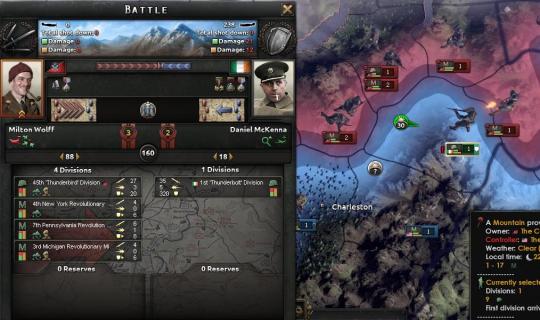
American militia units had stayed to defend the city, but McKenna had looked to secure the hills to the northeast. The Applachian plateau looked to give a good vantage point for artillery if any could succeed in the arduous task of towing them up to that position. Loyalist civilians had offered to do it on their own, pulling the units with their own work trucks, but that would be a dangerous undertaking without escort. McKenna took his Thunderbolts, with their own artillery pieces, to secure the hills first, while the militia guns could follow second when the way had been cleared. The Syndicates, tipped off by sympathetic informants, launched a massive push with their own 45th Thunderbirds, supplemented by local revolutionary forces, to prevent bombardment. The battle plan called for an overwhelming attack to break the dug-in mountain entrenchments, attacking from multiple directions in an attempt to dislodge the stubborn Irish defenders and find a weak spot.
McKenna demanded that the forces hold, using high-explosive burst shells over the heads of the enemy to maximize effect on the enemy. The engineers had dug in extensively, and had used dynamite to blast further fortifications and built entrenchments. The Thunderbolts only had a few guns, which were primarily pointed toward the northwest against the more highly-trained Thunderbirds. At such high elevation, and with such difficult terrain, evacuating casualties was difficult on the mountain, and men sometimes collapsed where they stood due to a combination of fatigue and high elevation.
That had been days ago, and the Thunderbolts were in tatters. The less wounded had even taken up shifts at night, or taking over service positions so able-bodied men could shoot and spot for the artillery. They had been holding, but just barely so. If it hadn’t been a mountain, they would have already been overrun. “I’ll be damned if I die on some cold rock half the world away from home.” McKenna defiantly continued to stand, hoping to wear down the superior numbers with artillery shells. He was the Wall of West Virginia, and he wouldn’t let the bastards through.
---
10 September 1937 - Pittsburgh, Pennsylvania
It had been months of hard fighting. Charleston had remained in Federal hands, and the front had stabilized, but all hopes of recovering the Federals in Kentucky were lost. The loyalists could only hope that the army groups had disbanded to make their way back to Federal territory in smaller numbers rather than being shot en masse, or worse, deserting to fall in with the enemy for their own salvation.
MacArthur had relied on the volunteers to fight a great deal of battles, more than he had preferred. The states under his control were tapped out for manpower resources, and if he started poaching from the factory floors for more able bodies he’d run out of supplies. Supply was irregular, especially for fuel, which he needed to keep the planes in the sky and the troops moving across the front. Olds and Tunner were able to airlift a lot of supplies, but demand always outstripped supply, and the more supplies he lifted the more danger there was for explosions in the cargo holds.
Ultimately, MacArthur decided that he needed to attack, to keep the pressure on the east so that the Syndicalists did not pull more men to prevent Eisenhower from marching toward Chicago from Kansas and the Dakotas. The Syndicates had been attacking south against the American Union State and fortifying out of New York City, and MacArthur had theorized that they would be weak in between those two strongpoints. The Brazilian and Argentine volunteers offered to push toward Philadelphia, with the hopes of breaking the regional command post and sending Syndicalist forces into disarray, while the Irish opted to push into Pittsburgh to seize the valuable steel mills and threaten a push into Ohio. The Mexican volunteers opted to remain in Virginia to help guard the line against the Longists; they had feared if the American Union State won, there may have been calls to expand further south to seize valuable oil and mining territories; fears of the Golden Circle expansion as it was dubbed in Mexico had been a hot button issue for the Mexican volunteers. If the Irish could secure Pittsburgh, that would give them control of the railroad junctions and the rivers, and allow MacArthur to bring in militia units to bring the territory under control with little fighting. With that, they could push further north toward Erie, splitting the Syndicalists and isolating them in New York. With Canada closing the border to the Combined Syndicates, even to the point of having the Royal Canadian Mounted Police arrest suspected border crossers and turning them over to the Federal government in Denver, that would render a similar fate to the lost Federals in Kentucky. MacArthur just hoped that his south could hold against the Firsters. Trading Virginia for Pennsylvania was not a winning proposition.
The B&O Line had been cut early, forcing McKenna and the Thunderbolts to march for most of the trip. Even in September, Pennsylvania was still hot, to help with water and the unfamiliar terrain McKenna had largely followed the Mononghaela river. To the east, he had Federal troops supplemented by Maryland militia moving north to take Harrisburg. McKenna force-marched his troops into Syndicate territory, hoping to secure a clear pathway along the rail lines for American repair crews to fix the B&O.
McKenna had been fortunate, western Pennsylvania had been defended by irregular militia units, poorly armed and lacking artillery support. In many cases, McKenna found that they didn’t have enough rifles for every man and only a few machine guns, some had taken to using shotguns better suited for partridge than men. When he was lucky, a few barrages from the field guns was enough to send them packing, but even without that, a dedicated attack usually was able to force back the disorganized units. A pity he didn’t have tanks, even a couple of old Weltkrieg landships would simply be able to drive to Pittsburgh unimpeded as long as it was gassed up.
The locals were fiercely divided. A few times McKenna had gone near towns, he had been welcomed and told where the Syndicates had kept their ammunition depot. Most of the time, however, the homes were ransacked, the supplies taken. Horror stories came to McKenna about “war syndicalism,” Reed’s name for the efforts taken to ensure his fighting men had the food they needed to fight. Sometimes it was the Combined Syndicates directly, but more often it seemed to be neighbors seizing on old grudges, summarily beating those they suspected of disloyalty and stealing their possessions, donating them to Reed as an act of solidarity. Worse still was what happened to those suspected of disloyalty. The Combined Syndicates offered a bounty on saboteurs and informants, and that had led to hastily-convened People’s Courts, serviced by hanging judges. Even so, there were plenty of people loyal to the Combined Syndicates, shouting their approval at finally destroying the brutal oppressors of Wall Street and their puppets in the Federal government. For a moment, McKenna thought of Ulster, and remembered everything he had heard 15 years before, and then he remembered the refugees from the British Isles after their revolution.
Pittsburgh had been hastily-fortified, with burned out hulks of cars blocking the bridges into town, forcing McKenna to navigate the crude fortifications with great care. The civilian population had largely huddled in buildings with boarded-up windows. The large buildings had been long ago hit by artillery fire or bombings from aircraft. Rail tunnels had been places of safety, McKenna’s scouts had found a few brave souls trading for various materials on picnic blankets. The mayor, who had thrown in his lot with the Syndicalists, had fled the city with the rest of the CSA, and they had thrown those city councilmen loyal to the Federal government into the Ohio. Coordination was largely infrequent, done by amateur radio. The civilians largely wanted to be left alone, out of the civil war, but the war had come to them despite their best wishes.
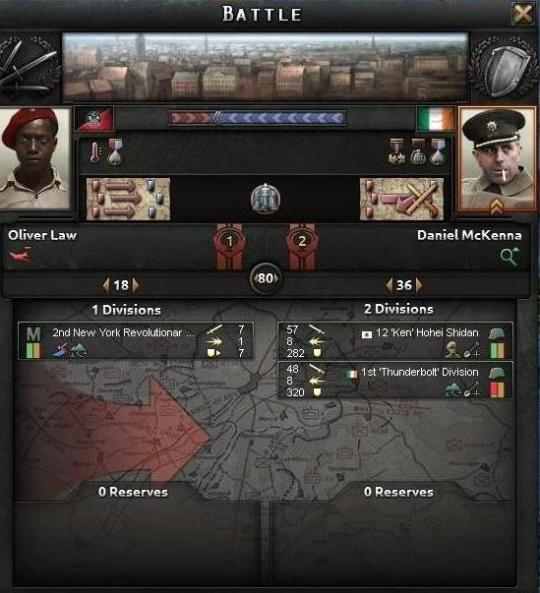
McKenna set to work, ordering his engineering corps to get the guns into firing positions. He positioned men near the Alleghany to prevent any CSA attack using the river to bypass his fortifications, and fortified the major exits with sandbags and machine guns. He had barely gone through half of his fortifications when he had heard the bad news: The Syndies were on the march along the Alleghany, and they would attack the city soon.
Yet, McKenna was not alone. The 12th Hohei Shidan, volunteer forces from far-off Japan, had come to support the Irish forces, and they had brought with them their Type 90’s, doubling McKenna’s supply of artillery. The Japanese and Irish soldiers met on the south side, and drew up plans for an attack. McKenna was given overall command, and elected to put his Irish veterans in the more dangerous forward position while the Japanese would fire on the CSA to draw them in under a battery of withering artillery fire. Once the enemy had descended past Lower Lincoln and could no longer enjoy visibility from Upper Lincoln, the Irish would ambush them in close quarters.
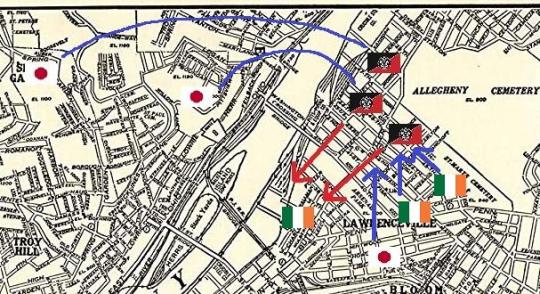
The CSA announced their attack with a radio command ordering all civilians to remain indoors, and all “foreign invaders” to surrender to the 2nd New York Revolutionary Guard, for handling by the legitimate United States government for repatriation. The 12th Hohei Shidan responded with a cannon barrage, thus commencing the Battle of Pittsburgh at 0900 on 10 September. McKenna’s Thunderbolts fought in ambush-and-retreat tactics, dividing themselves into seven-man fireteams. McKenna would fire on advancing CSA forces, retreat into a building, then have a second fireteam flank the New York Revolutionaries from across the street. Casualties were high on both sides, especially among the Irish who often refused to fight until in incredibly close combat, hoping the shock of the ambush would carry the day. Friendly fire incidents were high, especially as the day went into night, both from accidental fire on friendly troops and sympathetic civilians accidentally firing on who they believed were enemy soldiers. Yet the day stood. On 14 September, his squads battered and American troops pushing through central Pennsylvania, Oliver Law reluctantly ordered a retreat to the northeast. Western Pennsylvania stood liberated, but the war was not over yet.
---
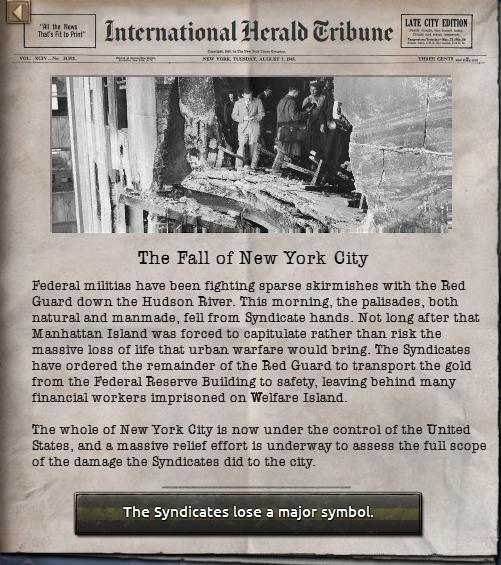
20 December 1937 - Welfare Island, New York City, United States of America
The icy winds of winter were howling, but the pit in Daniel McKenna’s stomach wasn’t from the cold. He had hoped to warm himself with a cigarette as he surveyed the successful conquest of New York City, but that had all left him. Naught but a short time ago, the celebration had been high. The Syndies had lost both a major symbol and, perhaps more pragmatically, their eastern command center. The Dominion of Canada had officially supported the Federal Government, and there had been Canadian, Indian, and French Republican volunteers sailing to Maryland to join MacArthur and the Volunteer Brigades, along with massive shipments of weapons from the Entente. Manhattan had surrendered rather than risk a massive urban brawl amongst the skyscrapers. That too, had seemed like a cause for celebration, but there was little sense of Christmas cheer among those who were picking through the ruins of New York City, for they had finally come to Welfare Island.
Inside, McKenna had found cell after cell of prisoners, skin stretched and hair falling out from starvation and malnutrition, their bodies broken from months of hard labor. When New York had fallen to the Syndicalists, they had imprisoned anyone who had worked in the financial sector, any who rented an apartment to another, or any who they considered to be bourgeoise, and demanded that they atone for the crimes of their previous lives with new, honest labor for the Syndicalist cause. They had been forced into the most dangerous jobs of the arms industry, like manufacturing artillery shells to the point where their skin had turned to a greasy yellow. Bleeding gums and fingers, limbs lost in machinery or explosive accidents were routine, each prisoner was a laundry list of atrocities written out upon their bodies.
Each horror that McKenna heard made him feel numb. He had nearly torn his gloves in two after listening, but he had made sure that he had heard it all, and that his staff heard it as well. A patriotic young woman, formerly a social columnist for the New York Tribune who had signed on to help with the support staff, volunteered to transcribe every word. “Be damned, lass, you’re a damn sight braver than any fella. Write it down, every bloody word, and know that ye’ve got a ironclad heart three times larger than any bastard who tells ye different.”
McKenna had dispatched three messages from New York. The first was to General MacArthur, who had said: “Am pleased to deliver to you New York as an early Christmas present.” The second was to Michael Collins, relaying a request for more reinforcement of men and materiel. The third, a private correspondence, bemoaned what he had seen. “The brutality of what I’ve seen is beyond words, and the only thing that breaks me more is the thought that this is not some singularly unique moment of malice, that we’ll find another Welfare Island in the South run by those America First bastards. God help me, is this what we left the English to in ‘25? Did we look at an Englishman for all those years and see the English and not the man?”
“Private. Bring all the Syndie prisoners we’ve got, make them see what went on here, make ‘em stare at each one. If they look away, hit ‘em. Then find the officers, and see which ones knew about it. And if ye find one that did...hang ‘em from the Brooklyn Bridge.”
---
Alright, that’s the second chapter, with the Syndicates on the ropes and the Firsters being slowly ground down in the western theater. The third chapter will handle the defeat of the Syndicalists and the Firsters and Mosley’s opening shots for his invasion of Ireland. Let me know what you think. And yes, I know some of the pictures are from 0.12, I’ve already mentioned that in my first post on the topic, and I know the battle map is crude; I suck at art. Also, what do you think about cropping the screenshots to make them easier to read? I think it looks fine, not too pixelated or zoomed in, but it does lose the sort of authentic “AAR screenshot” feeling. Which do you prefer, readers?
Images
Cactus Jack Becomes President
Standoff in America
Second American Civil War Begins
Battle of Baltimore
Encircled Federal Troops in Kentucky
US Moves the Capital to Denver
Germany Approves the Irish Business Initiative
Spain Approves the Irish Business Initiative
Italy Approves the Irish Business Initiative
The Netherlands Approves the Irish Business Initiative
The United States Approves the Irish Business Initiative
Canada Approves the Irish Business Initiative
Sweden Approves the Irish Business Initiative
Austria Approves the Irish Business Initiative
Rigged 1937 Election
The Wall of West Virigina
The Battle of Pittsburgh
Pittsburgh Battle Map
The Fall of New York
-SLAL
22 notes
·
View notes